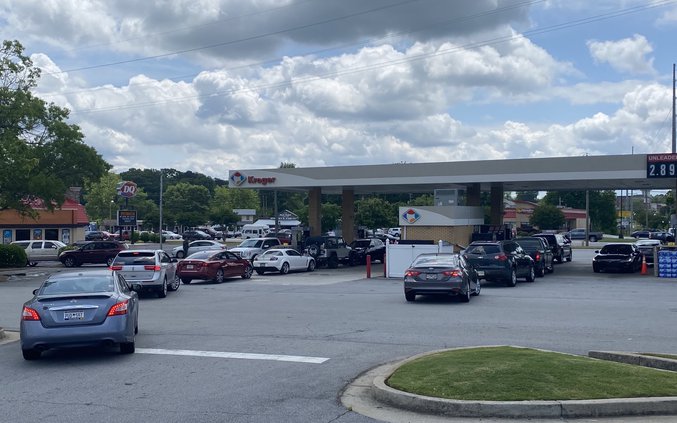This is an opinion.
It seems to me it’s about time the federal government begins finding ways to go around the ongoing mess that is Colonial Pipeline Co.
The company based in north Fulton County near Atlanta apparently never saw a cyberattack coming to its operations that provide about 45% of all fuel to the East Coast.
The FBI has identified a foreign group which tapped into Colonial’s online system it uses to operate its pipeline that transports a very valuable commodity.
It is keeping our economy moving as it slowly recovers from the COVID-19 pandemic.
The line provides 45% of the fuel that keeps small businesses operating in states from Texas to New York, including Georgia.
It moves 45% of the fuel that allows people to visit their relatives in-person this Memorial Day for the first time in more than a year because of safety concerns around the COVID-19 pandemic.
It’s almost half of the fuel people need to drive to the supermarket — or for those who transport groceries to people’s homes.
If you haven’t heard, over the weekend Colonial Pipeline announced they were the victim of a cybersecurity attack and, as a precaution, shut down its pipeline which runs from Texas to New York Harbor.
AAA is forecasting gas prices will climb this week in reaction to the shutdown of Colonial Pipeline’s East Coast mainline.
Some lateral lines had reopened Monday but there was no word of when the mainline, including the gasoline line, would reopen.
AAA predicted 3- to 7-cent increases but, obviously, gas station owners being capitalists means those prices could jump even higher.
This is the latest debacle for the company and should come as a warning for federal regulators and others in power to make changes in how gasoline is distributed.
Before this, Colonial was best known for its regular pipeline breaks that have spilled millions of gallons of precious fuel into our equally precious waterways — many of which are used as drinking water sources.
Colonial Pipeline carries 2.5 million barrels per day along 5,500 miles of pipeline and consistently runs at or near full capacity, according to the U.S. Energy Information Administration.
It connects 29 refineries and 267 distribution terminals, carrying refined petroleum products such as gasoline, diesel, heating oil, and jet fuel from as far west as Houston, Texas, to as far north as New York Harbor.
Georgia has eight segments of a 27-inch line running 266 miles through the state.
Colonial has accumulated 23 civil enforcement actions and more than $500,000 in civil penalties issued by the Pipeline and Hazardous Materials Safety Administration since 2007, according to North Carolina Policy Watch.
My introduction to Colonial came when one of its pipelines ruptured in rural Middle Tennessee and caused significant pollution of the waterways around it after it was discovered days after it began.
The company sent in teams of public relations people to assure the public there was no problem with hundreds of thousands of gallons of refined gasoline being mixed with water people used to feed their livestock and use for drinking water.
Colonial was the source of South Carolina’s largest pipeline spill in 1996 near Fork Shoals, South Carolina, after it spilled nearly 1 million gallons of fuel into the Reedy River.
According to North Carolina Policy Watch, the company knew that part of the pipeline was weak. Colonial pleaded guilty to criminal negligence and was fined $41 million under the Clean Water Act. The company also paid $13 million in settlements in one of the largest environmental disasters in South Carolina history.
In 2003, the Department of Justice and the Environmental Protection Agency settled with Colonial on charges the company violated the Clean Water Act on seven occasions by spilling 1.45 million gallons of oil from its 5,500-mile pipeline in five states. It paid a record $34 million civil penalty.
In recent years, a partial shutdown of the Colonial Pipeline system disrupted gasoline supplies and caused higher prices and product shortages after a leak was discovered about 35 miles south of Birmingham, Alabama, in September 2016.
The company was forced to build a 500-foot, above-ground bypass around the affected section of pipeline as about 336,000 gallons of gas spilled.
Federal documents showed the company reported five spills in Alabama in 2016 alone, NC Policy Watch reported.
In 2020, the federal Pipeline and Hazardous Materials Safety Administration fined Colonial $61,000 stemming from a 2016 investigation into training inadequacies at its Alpharetta headquarters.
The company failed to evaluate the performance of several workers whose actions contributed to several accidents. Colonial also failed to document all the details contributing to the accidents, NC Policy Watch reported.
It also listed citations and fines to the company for lack of training and following procedures between 2012 and 2019.
I think it’s time this nation finds an alternative to dealing with Colonial’s business operations before another foreign group disrupts our fuel supply again.
Tom Spigolon is news editor of The Covington News. He may be reached at tspigolon@covnews.com.




